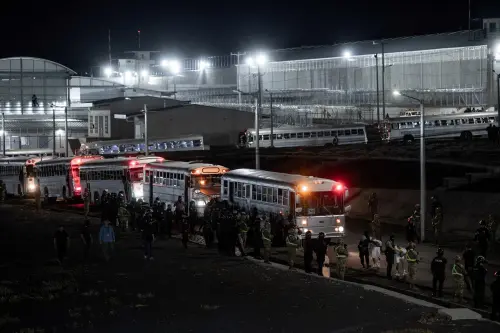The Trump administration may face repercussions for violating a judge's order regarding the deportation of hundreds of Venezuelan migrants, as indicated by a U.S. District Judge. This judge granted the government additional time to clarify the expulsions, suggesting the administration could invoke the state secrets doctrine to shield sensitive national security information from public disclosure.
The judge expressed skepticism that adhering to the order would compromise national security. He noted a social media post by Secretary of State Marco Rubio, which contained details about the deportation flights.
This ruling provides a temporary reprieve amid escalating tensions with the administration, which called for the judge's impeachment after the order was issued. This request garnered a rare public rebuke from Chief Justice John Roberts.
The judge, appointed by former President Barack Obama, is assessing whether the administration disregarded a weekend order preventing the deportation of hundreds of suspected Venezuelan gang members under an 18th-century law. He has a history of bipartisan support; he was confirmed to the federal bench in 2011 with an overwhelming 96-0 Senate vote.
Following the judge's order, three planes transporting deported Venezuelans landed in El Salvador, where the migrants are currently detained. The judge did not disclose details regarding the departure and arrival of the first two planes, prompting the Trump administration to accuse him of overstepping his authority.
In a recent court filing, the administration argued that the pending questions represent significant overreach into executive branch authority. The judge extended the administration's deadline, clarifying that he sought information to determine if the government had deliberately ignored his order and to establish potential consequences, which he did not specify.
Critics of Trump and several legal experts have raised concerns about the implications of the administration defying judicial rulings, which could undermine the balance of power between the executive and judicial branches as established by the U.S. Constitution.
In a Fox News interview, Trump asserted that his administration would comply with court orders and expressed confidence that the Supreme Court would ultimately rule in his favor regarding the deportation case. However, he criticized the judge, calling for Boasberg’s impeachment and labeling him a far-left "troublemaker and agitator."
Chief Justice Roberts rebuked Trump for his impeachment call, emphasizing that an appeal, rather than impeachment, is the appropriate course of action when contesting a judge's decision.
In his blockage of deportations for two weeks, the judge maintained that the 1798 Alien Enemies Act did not substantiate Trump's claim that the presence of the Venezuelan gang Tren de Aragua in the U.S. amounted to an act of war.
During a court hearing while two planes with deportees were airborne, the judge instructed Justice Department lawyers that any plane containing individuals subjected to his order must return to the U.S. His written order was publicly filed shortly thereafter, around 40 minutes after his court remarks.
The two planes subsequently landed in Honduras before continuing to El Salvador, while a third flight from a Texas airport occurred after the order's public announcement.
Justice Department lawyers contended in court documents that the judge's verbal orders were unenforceable and that the deportees on the third flight were not being deported solely under the 1798 law. Neither the Justice Department nor the State Department responded immediately to requests for comment.
